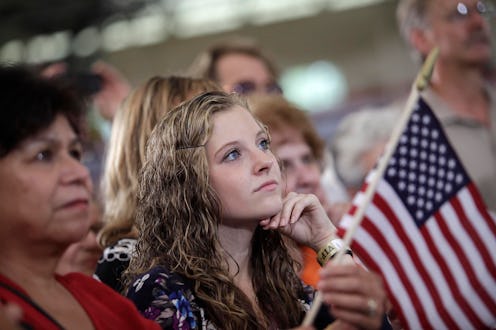News
What Young Republican Women Actually Think About Reproductive Rights

Since Hillary Clinton lost the 2016 presidential election, divisions within the Democratic party have taken center stage. Many in the team that worked for Clinton's former Democratic contender, Bernie Sanders, have launched Our Revolution, a political group that aims to push the left of mainstream Democrats' agenda that the Vermont senator campaigned on. Some in the party are attempting to damage or eliminate Democratic elected officials who are seen as insufficiently "progressive," like The Young Turks Cenk Uygur, who is pushing support for "Justice Democrats" to take over the party.
Lost in this shuffle, however, is an equally important dialogue about the many divisions within the Republican Party, which seemed to be in the midst of an identity crisis on the eve of the election.
Despite having control of Congress and the White House, many of these ideological differences within the Republican party persist. For example, younger Americans increasingly identify as libertarian, according to a 2015 YouGov survey; this could indicate that candidates like Ron Paul, who previously lost out to more "mainstream" Republican candidates, may have a better shot at the nomination in years to come.
Conservative women, in particular, are at a unique ideological crossroads. Women who identify both as feminist and Republican have been forced to grapple with the implications of a party who nominated a candidate infamous for his disrespectful remarks about women.
Six young women who identify as Republican tell Bustle what what the conservative experience has been like for them. Like the Republican party as a whole (and, for the record, like the Democratic party as a whole), these young women are not an ideological monolith. On matters traditionally considered "women's issues," for example, these women are unafraid to disagree with people on either side of the aisle.
In particular, young female Republicans are divided on abortion rights, something exemplified by the controversy that followed Tomi Lahren's recent pro-choice statements.
Some women, believing that life begins at conception, share the Republican party's commitment to ending abortion. For them, Republicans' pro-life policies are an important component of the party platform.
"Abortion should absolutely not be legal, except in cases where the actual life of the mother is threatened," Truman State University student Rachael Newton tells Bustle. "I believe that from the moment an egg is fertilized, it is human."
What frustrates me about the Republican platform is that with all the focus on preventing abortions, there's still so much opposition to real sex education and birth control.
Fordham University student Dominique Marino believes abortion is "demeaning for women." She tells Bustle, "I think that as women, if we so choose to take on the responsibility to make the mature decision to be sexually active, we must also be responsible to acknowledge the potentiality of that activity. I think society undermines the capacity women have to make thoughtful, intentional decisions."
Many of these young, anti-abortion conservatives also oppose federal funding for Medicaid recipients seeking treatment at Planned Parenthood.
While each woman is aware that under the Hyde Amendment, federal funding cannot be used to fund abortions, many are still opposed Medicaid funding for other services, arguing that the organization could simply reallocate its donations accordingly.
"Any money [Planned Parenthood] receives from the government to cover non-abortive treatment will simply free up more donations to provide abortion," Truman State student Annorah Harris tells Bustle. "While indirect, [federal funding] could still help fund abortions."
"Like sex, abortion is going to happen no matter how much we shame people for it or if it's made illegal."
But for some women, conservatism no longer hinges on opposing abortion.
"I do believe abortion should be legal with term limits and other obvious regulations," says Sasha Grujin, a student at the George Washington University. Grujin also tells Bustle that Medicaid recipients who go to Planned Parenthood "for a cancer screening, checkup, or anything of the like should be covered, as most of those patients will not be accepted at any other clinic."
Crossing party lines, University of Virginia student Ali Hiestand paraphrases an old (Bill) Clinton talking point, telling Bustle that abortion "should be 'safe, legal, and rare.'"
Hiestand says, "Like sex, abortion is going to happen no matter how much we shame people for it or if it's made illegal."
While Hiestand is a proud Republican (she even serves as chair of University of Virginia's College Republicans), she is still willing to criticize what she views as the party's weaknesses — which include its approach to abortion, as well as contraception. "What frustrates me about the Republican platform is that with all the focus on preventing abortions, there's still so much opposition to real sex education and birth control," she says.
George Washington University student Juliette Erath, who believes "abortion should not be legal," nevertheless shares Hiestand's beliefs about providing clear information to young people about sex and contraception. While many Republicans support abstinence-only education — and it was promoted in the 2016 Republican platform — Erath tells Bustle, "I think there is a great need for comprehensive sex education in schools so that young adults properly understand the topic. I think that birth control is also fine as long as it is used responsibly."
Erath and Hiestand's comments seem common amongst young conservatives. According to a study by the National Campaign to Prevent Teen and Unplanned Pregnancy, 57 percent of Republicans ages 18 to 34 have a positive view of birth control.
Even as the Republican establish largely continues to define itself by its opposition to abortion and by seeking to limit access to birth control, it is not clear that the party's youngest members will fall into line. As Republicans look forward to 2018 and beyond, they must contend with the reality that the Democratic party isn't the only one with an ideologically diverse base.